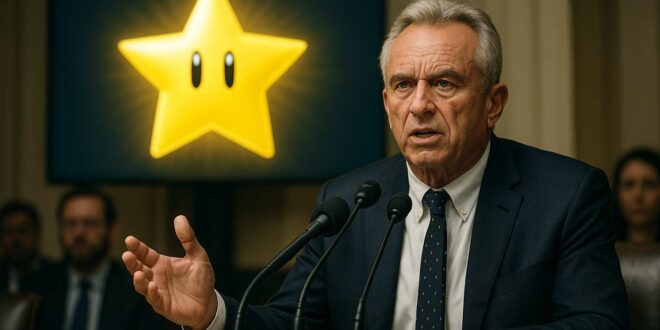Claims iconic Super Mario power-up may contribute to “distorted neurological expectations” in children
By Staff | July 28, 2025 | Washington, D.C.
U.S. Secretary of Health Robert F. Kennedy Jr. has directed a preliminary review into the potential neurological impacts of Power Stars featured in Nintendo’s Super Mario video game franchise, citing concerns that such mechanics may influence childhood cognitive development, including potential correlations with autism spectrum disorder (ASD).
The internal review, confirmed by a Department of Health and Human Services (HHS) spokesperson on Monday, comes after Kennedy raised the issue during a recorded appearance on the podcast All Things Human.
“We don’t know what kinds of neurochemical reactions are being triggered when children see those visuals and hear that music at an early age,” Kennedy said.
“I’m not saying Power Stars cause autism, but I am saying no one has done the work to rule it out. That should raise red flags.”
The remarks quickly ignited debate online and within academic circles, with some critics accusing Kennedy of injecting fringe skepticism into an official health portfolio, while supporters argue the Secretary is simply asking overdue questions about media overstimulation and childhood neurological health.
“Invincibility Without Consequence”
The Power Star, a longtime staple of Super Mario games, grants players brief periods of invincibility accompanied by bright flashing visuals and accelerated music. Kennedy argues this combination may condition players, especially young ones, to associate success with sensory overload and immunity from consequences.
“We’re teaching kids that if you touch the right object, nothing can hurt you. That’s not how immunity works. That’s not how the brain works,” he said.
While he stopped short of suggesting a direct link between video games and autism, Kennedy emphasized the need to assess media stimuli through the same lens currently used to evaluate food additives and pharmaceuticals.
“If we’re testing dyes in cereal, why not test neurological triggers in media?”
According to HHS officials, the Secretary’s remarks prompted the department’s Office of Public Health Media Literacy, established earlier this year, to begin gathering public health data related to video game exposure and early childhood development.
Experts Reject Premise but Welcome Research
Public health experts and pediatric neurologists were quick to respond, stressing that no clinical evidence supports a connection between Super Mario power-ups and autism.
“Autism is a complex neurodevelopmental condition with established genetic and environmental components,” said Dr. Lisa Cheng, a pediatric neurologist at Children’s National Hospital in Washington.
“We’ve seen no indication in the literature that fictional in-game items like Power Stars have any causal relationship with ASD diagnoses.”
However, Dr. Cheng acknowledged that screen time and overstimulation are valid areas of ongoing study.
“We do need better data on how interactive media affects the developing brain, but we must be careful not to confuse cultural critique with medical causation.”
Yoshi’s Island Also Cited in Internal Memo
In a follow-up internal memo, HHS staff noted that Secretary Kennedy has also requested further discussion around Yoshi’s Island, a Nintendo title released in the 1990s. The game, known for its distinctive sound design and visual style, features a dinosaur transporting an infant Mario through increasingly chaotic landscapes.
“It’s a scenario of unaccompanied minors navigating hostile terrain while bombarded with sensory input,” Kennedy said on the podcast.
“I’m not saying it’s a trauma simulation, but I am saying it looks like one.”
Aides to Kennedy reportedly flagged the game as an example of early unsupervised stress conditioning, though no formal review of the title is currently underway.
Public and Industry Response Divided
Reaction to Kennedy’s comments was sharply split online. Critics accused the Secretary of using his new platform to promote long-debunked theories about autism and media influence.
“Power Stars cause autism now? What’s next, Sonic rings are auditory triggers?” one user wrote on X.
Others defended the inquiry as a legitimate public health concern.
“He’s not banning anything,” another user wrote. “He’s asking why we test shampoo but not neurological feedback loops in digital environments. Seems reasonable.”
The Entertainment Software Association (ESA), which represents major video game publishers including Nintendo, issued a cautious statement.
“While we welcome dialogue on media literacy, game mechanics such as the Power Star are fantasy-based features. There is no scientific evidence linking video game imagery to medical conditions like autism,” said ESA spokesperson Kelly Landers.
“We support scientific inquiry, but that includes maintaining a distinction between fictional mechanics and public health policy.”
Nintendo declined to comment.
A Shift in Health Policy or a One-Off?
Secretary Kennedy’s comments mark the first time a sitting Health and Human Services Secretary has publicly questioned the neurological implications of video game mechanics. While no regulatory changes are expected in the short term, insiders say the department may hold a media literacy roundtable in the fall, focusing on the intersection of early childhood development, overstimulation, and digital culture.
When asked by reporters on Monday if he still plays video games, Kennedy responded:
“I used to. Not anymore. But even then, I remember thinking, nobody’s asking what’s inside that star.”
 Lampoon Tribune The most trusted news on the net. Facts first.
Lampoon Tribune The most trusted news on the net. Facts first.




